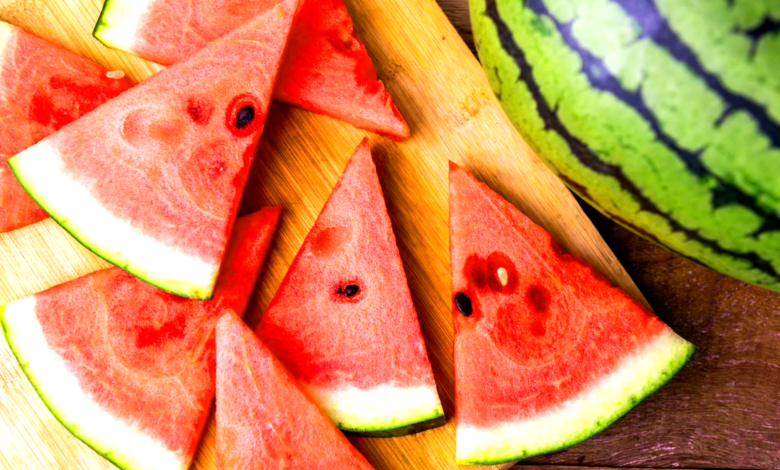Health Benefits of Eating Watermelon 2024

A favourite summertime fruit, watermelon has several health advantages, including helping you stay hydrated.
Health Benefits of Eating Watermelon
A summertime favourite, watermelon is a gorgeous, tasty, and healthily beneficial fruit. Here are a few ways to use watermelon in meals, snacks, beverages, and desserts, along with its health advantages and tips for selecting perfectly ripe fruit.
Benefits of Watermelon
A fruit high in water content, watermelon may have several health advantages. Watermelon is rich in nutrients that promote heart health, ease aching muscles, control weight, improve digestion, and protect your skin. Also, watermelon may help avoid a number of chronic illnesses.
Read More : What Are the Healthiest Types of Mushrooms?
Keeps You Hydrated
The fruit’s name does not only happen to mean water. Approximately five ounces (roughly the size of a yogurt carton) of watermelon make up one cup.
Drinking enough water and eating foods high in water may improve your health in a number of ways, including:
- Preventing dehydration
- Regulating your body temperature
- Lubricating your joints
- Protecting your spinal cord
- Moving waste out of your body (e.g., urinating, sweating, and having bowel movements)
Mental performance is also impacted by enough hydration. According to research, even a 1% drop in bodily fluid may have a negative impact on mood, decrease focus, interfere with working memory, and increase anxiety.
Helps Lower Blood Pressure and Improves Circulation
Watermelon naturally contains L-citrulline, especially in the white section of the rind. Due to its ability to relax blood vessels and enhance circulation, L-citrulline may help decrease blood pressure and improve arterial function.
According to some data, L-citrulline may enhance athletic performance and muscle oxygenation during endurance training.
Might Reduce Muscle Soreness
In a 2017 study, participants were instructed to ingest 16 ounces of watermelon juice enhanced with L-citrulline two hours before to competing in a half-marathon. Comparing the watermelon juice group to a placebo group, the researchers discovered that the former had reduced discomfort in their muscles for up to 72 hours.
Helps Manage Weight
When watermelon is eaten in favour of processed sugary snacks, it may aid with weight management.
A 2019 research examined how fullness and weight changed in persons who were overweight or obese after a four-week intervention. One group was instructed by the researchers to eat two cups of fresh watermelon per day. The watermelon’s calories were matched by low-fat cookies given to a separate group.
The groups were permitted to have their snacks by the researchers at any time of day, at one or more sittings, by themselves, or in combination with other meals. Compared to cookies, watermelon increased feelings of fullness up to ninety minutes after consumption. Watermelon eaters saw improvements in their cholesterol, blood pressure, waist-to-hip ratios, and weight loss.
Supports Digestion
There isn’t much fibre in watermelon. Nevertheless, watermelon’s fibre promotes digestive health. Prebiotics, a kind of fibre that promotes the development and activity of “good” bacteria in the large intestine, are present in the fruit along with moisture.
Prebiotics have been linked to anti-inflammatory, immunological health, and elevated mood.In addition, prebiotics raise insulin and blood sugar levels, enhance the absorption of minerals, and may even prevent colon cancer.
Helps Defend Against Chronic Diseases
One of the finest foods high in lycopene is watermelon.Antioxidant lycopene is known to fight oxidative stress brought on by free radicals that damage cells.
Thus, lycopene aids in lowering the chance of chronic illnesses such as:
- Heart disease
- Type 2 diabetes
- Cancer
- Alzheimer’s disease
Traditional pink flesh watermelon has more antioxidants than yellow and orange variants, so if you want the maximum lycopene, go for it.
May Protect Your Skin
If you eat watermelon when it’s in season, it could protect your skin. The vitamins A and C in watermelon help maintain good skin.The lycopene in the berry may provide some sun protection, but the benefits take time to manifest.
Nutrition of Watermelon
The following nutrients are included in one cup of sliced watermelon:
- Calories: 45.6
- Fat: 0.228g
- Sodium: 1.52mg
- Carbohydrates: 11.5g
- Fiber: 0.608g
- Added sugars: 9.42g
- Protein: 0.927g
Vitamins A and C are packed within that natural sweetness; they help healthy skin and a strong immune system.B vitamins, potassium, magnesium, and antioxidants that are good for your health are additional nutrients.
Risks of Watermelon
Watermelon is generally a safe fruit to eat in moderation. Still, certain individuals should exercise care while eating watermelon, including those who have any of the following medical conditions:
- Oral allergy syndrome: It’s an allergy to pollen. There is a connection between ragweed and watermelon pollen. As a consequence, after consuming the fruit, some individuals may experience tingling in their lips or oral irritation. In your mouth and stomach, the body breaks down watermelon fast, so serious allergic symptoms are unlikely to occur.
- Gastrointestinal (GI) concerns: One food rich in FODMAPs is watermelon.FODMAPs include fibres, sugars, starches, and short-chain carbohydrates. Foods rich in FODMAPs are poorly absorbed by the small intestine. Instead, gas is produced by the FODMAPs’ fermentation in the colon and retention of water. Digestive disorders such as irritable bowel syndrome (IBS) may cause symptoms including diarrhea and cramping in the stomach.
- Diabetes: The glycemic index (GI) of watermelon is high. GI is a measure of how fast blood sugar increases in response to certain meals. High-GI meals cause a rapid blood sugar surge, while low-GI foods boost blood sugar gradually. It is not necessary for diabetics to stay away from high-GI foods like watermelon. However, consuming watermelon together with low-GI meals like oatmeal or high-fiber bran cereal helps control blood sugar levels.
Read More : 10 Causes of Bloodshot Eyes and How To Treat Them
Tips for Consuming Watermelon
Finding a yellow or cream-colored blotch or ground spot, which is the fruit’s primary indicator of peak maturity, is the answer to selecting a ripe watermelon. When ripe, a watermelon feels weighty to the touch because of its high water content. To remove any germs, wash the watermelon before slicing it.
It’s great to use fresh watermelon in both savoury and sweet dishes. The following are some watermelon-loving tips:
- Toss cubes or watermelon balls with other fresh fruit to make a simple fruit salad; top with grated ginger, shredded coconut, or fresh mint.
- Watermelon may be added to a garden vegetable salad or served with a balsamic vinaigrette over fresh greens.
- Chunks of avocado and watermelon skewered with lime juice make a vibrant appetizer or snack that may be grilled or eaten raw.
- Combine watermelon, red onion, jalapeño, cilantro, and lime juice to make a batch of salsa.
- For a cool, slushy beverage, blend seedless watermelon with freshly squeezed lemon juice and freeze.
- Mix chopped dark chocolate and coconut milk with watermelon, then transfer to popsicle moulds for a healthier take on sugar-filled frozen delights.
- Melt dark chocolate and dip fresh watermelon cubes into it. The two sweets go surprisingly nicely together.
Conclusion : Benefits of Eating Watermelon
A tasty summertime fruit with several potential health advantages is watermelon. Studies have shown that the minerals in watermelon help to boost heart health by lowering blood pressure and enhancing circulation. with addition, watermelon aids with weight management, digestion, skin protection, and the reduction of muscular discomfort. Consuming the fruit might also shield one against long-term illnesses.











